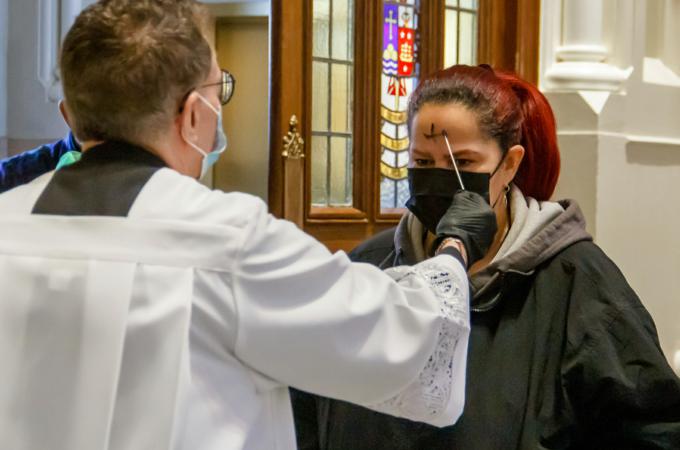Changes mark traditional Ash Wednesday liturgies
SOUTH END -- As in churches throughout the archdiocese, Ash Wednesday services at the Cathedral of the Holy Cross looked different from previous years due to protocols necessitated by the coronavirus pandemic.
In recent years, on Ash Wednesday, the cathedral has had priests rotate throughout the day to be available to impose ashes on anyone who comes in between services. They continued that practice this Ash Wednesday, which fell on Feb. 17. The cathedral remained open from 9 a.m. until 7 p.m., and held three Masses in English, one in Spanish, and one in Latin.
There were, however, a few changes. People receiving ashes in between Masses had to provide contact-tracing information. Both during and outside of Mass, ashes were imposed on foreheads using disposable cotton swabs rather than the minister's thumb. And packets of blessed ashes were available for those who preferred to bring them home.
Father David Taurasi celebrated the cathedral's 9 a.m. Mass. In his homily, he talked about how the ashes signify externally what is taking place internally. He said they are a sign that the recipient is now going to take their faith seriously.
"Ashes are a sign and symbol of the interior life which we begin today to live in a very intense way," he said.
He talked about the liturgy's reading from the Gospel of Matthew, in which Jesus talks about how to practice prayer, fasting, and works of charity.
"Our blessed Lord and Savior reminds us that our observance should be an interior observance. It really and truly doesn't matter the outward appearances of things that we do, but rather the intentions of our hearts," Father Taurasi said.
He said that Jesus' instruction to "go into your rooms" to pray carries both literal and spiritual meaning.
"During the Lenten season, we're called to go into the rooms of our own hearts (and) open our hearts to God," Father Taurasi said.
He said that while it is good to sacrifice certain foods or activities during Lent, it is more important to give up sin and selfishness.
"If we are the same people on Easter Sunday as we were on Ash Wednesday, then Lent has failed, or rather, we have failed to live Lent," he said.
After delivering the homily, Father Taurasi blessed the ashes with holy water. Attendees had the opportunity to receive communion and ashes at the end of the Mass, after the final blessing, as they exited the cathedral.



















